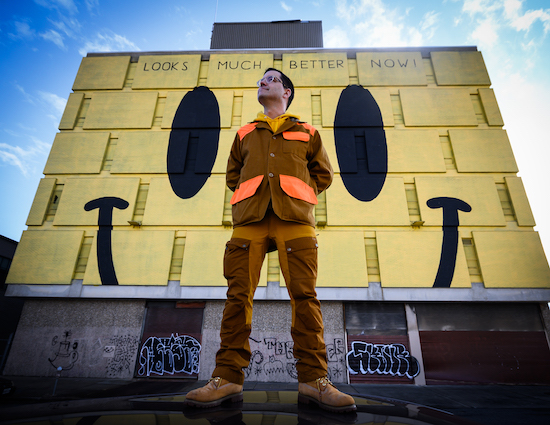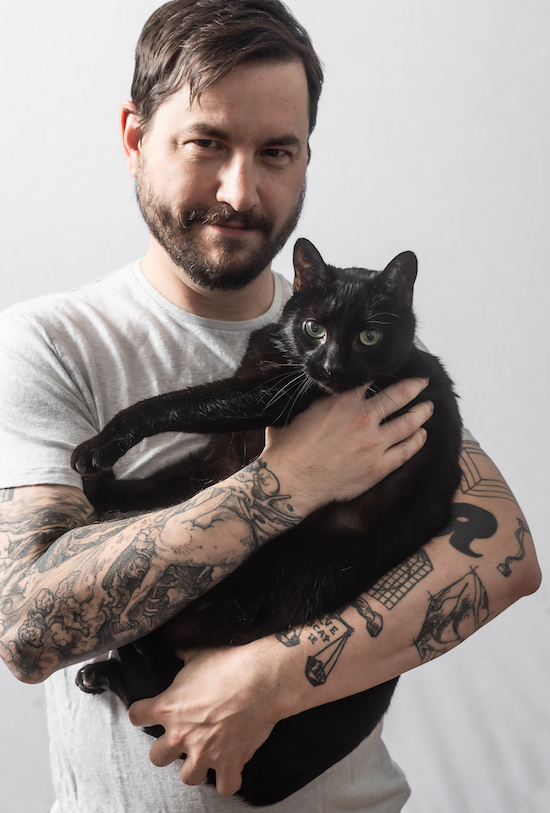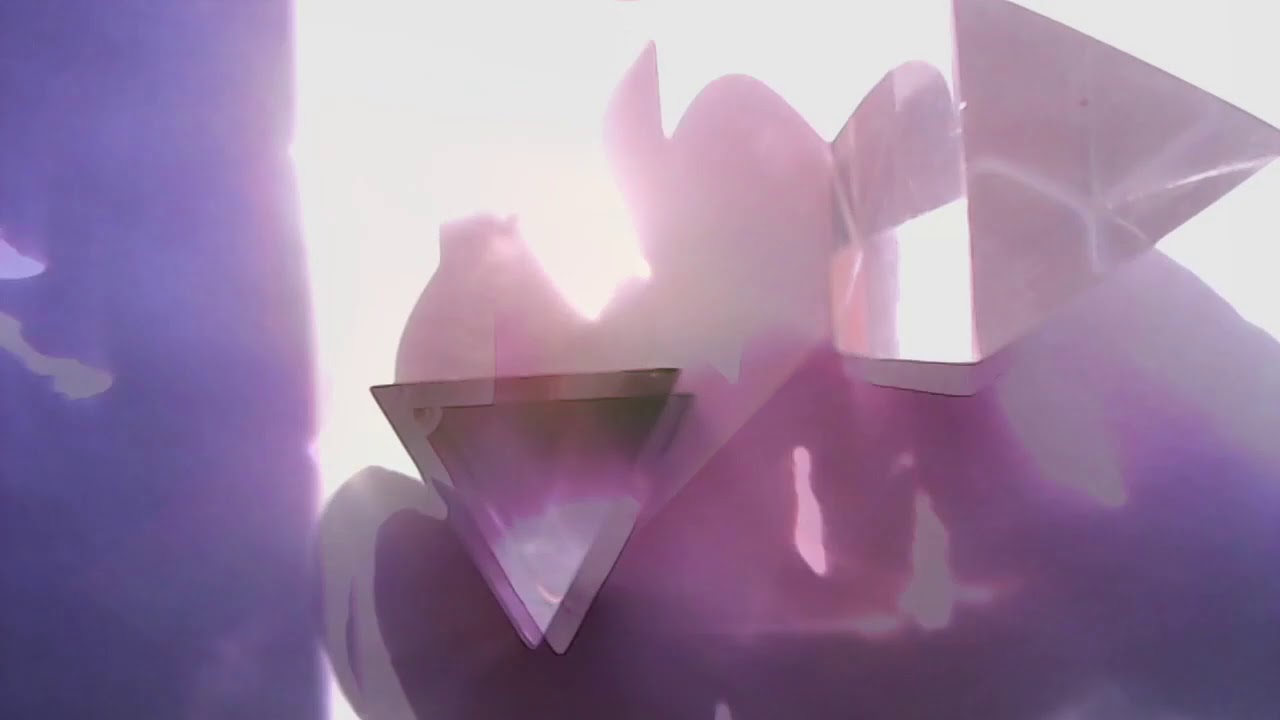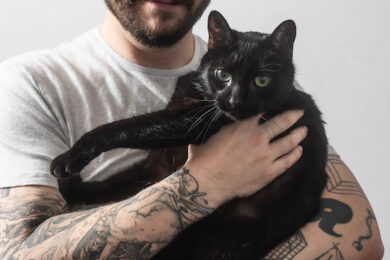Drew Daniel portraits by Josh Sisk
"I’m 49 years old and I’m a Shakespeare professor," Drew Daniel tells me over Skype. "I’m not somebody that needs to pretend that I’m on the cutting edge of exploratory dance floor culture, because that’s just not my life anymore. And the music that I made when I was 30 is different from the music I’m making now that I’m almost 50. It would be weird if that wasn’t true."
I’d just returned from walking several miles of loops around the running track in an empty park in Metro Detroit – a daily centring ritual since entering COVID-19 quarantine. Since early March, Daniel’s new LP, Shall We Go On Sinning So That Grace May Increase?, has been my walking companion as I try to pace away the feeling of lockdown dread. By April, an extra layer of birdsong began to bleed in through my headphones, becoming more frenetic as Michigan’s winter began to shift fully into spring – the pleasant weather seeming wholly inappropriate.
"It feels kind of surreal, narcissistic, and petty to contemplate one’s own art in the midst of catastrophe, you know? And I also don’t want to retroactively apply present circumstances to an album I made like a year ago," says Daniel. But here we are, nonetheless. It’s nearly May. Our world has been sent lopsided as the official release date for the first Soft Pink Truth LP since 2015’s Why Pay More? rapidly approaches.
Speaking of surreal, the morning I spoke with Daniel, I’d spotted a coyote a few blocks ahead of me, loping across a normally packed intersection in a residential neighbourhood. Less weird, but still off-putting, was being dive-bombed by a crazed American Robin protecting its nest just as I was coming to the realisation that the creature I was seeing was indeed a coyote. I’d been doubly shaken out of a zone of complacency cultivated in part by the first fifteen minutes of Shall We Go On Sinning So That Grace May Increase? – ostensibly one long piece of music split into two sides and subdivided into tracks – by the choral, almost folkloric introduction ‘Shall’ and the wonderfully house-inflected ‘We’.
I’d hate to give the impression that Daniel’s LP is all easy, calm vibes. On the second side, a wall of urgent alarms climbs up and crashes down from under waves of rocking bass and wandering piano chords, just as you least expect it.
"I want music that has tension and acknowledges conflict. My way of doing that was to have this unexpected gut punch moment, 17 minutes in," Daniel says. "It’s like setting off a fire alarm in the middle of a yoga class. It’s going to work for some people and they’re going to get why I did that. Other people are just going to think I’m being an asshole."
There’s some genius in this moment. A perfect bit of aural mimesis mirroring that fight-or-flight feeling that has come to define life for many of us since at least the 2016 election – oscillating from low-level whispers to moments of all-out panic.
I spoke with Daniel back in March from my home studio turned work-from-home office.
When I first pitched this interview, I thought I was going to be in Baltimore doing research, and we’d get a chance to meet in person. And obviously that’s not happening now. But how has life changed in Baltimore? Were you planning on touring with this album?
Drew Daniel: I’m alright. Obviously, all our lives are totally weird. There was supposed to be a DJ set where I was going to perform some of this material. I was actively trying to figure out – how do I make this compelling as a live experience? How do I square the circle of the dance music polarity and the ambient-relaxation-drift-meditation polarity? How do you make those two things equal in a live context? I was going to follow a dance performance by Peter Redgrave in Baltimore at the Mercury Theatre. And now of course, you’ve got to rethink everything.
I’m a professor in the English department at Johns Hopkins, so my life now involves recording lectures and uploading them and suddenly having to create about 12 hours of video content [a week]. That’s a big change. I had my first class with my students yesterday where we all Zoomed together. It was a smaller seminar on trans theory, Renaissance literature, and representations of non-normative gender in the Renaissance. It was a really sweet class and it was good to be together with people. At first it was very awkward and stiff, and then it gradually warmed up and everybody started to contribute. I also told them, "You’re all gonna get A’s." I’m not going to be a dog catcher or a cop here. I’m not interested in adding stress to anybody’s life about assessment. Everything’s got to change, you know – we have a chance to really hit reset. And I hope that we do.
Lucky kids, to have you as a prof! The new Soft Pink Truth LP is quite a bit different than previous releases. In the past you played with black metal and disco and crust punk. There have been house elements that float in and out in your catalog, and Shall We conjoins some of those house elements with the contemporary classical arena. What inspired the shift? What were you listening to that fed into the project?
DD: Well, you know, my whole world (like everybody’s) was shaken up by the election of Trump. A lot of things that informed my understanding of, "What kind of emotions do I want to put out there?" were also called into question. I think the sense of needing to rethink was very strong for me. I listened to a lot of long form music that just gives space a kind of a tint or emotional horizon that doesn’t change that much, you know? And that music is sometimes understood as ambient and sometimes not. "Ambient" is kind of a loaded word because it’s so elastic about what it does or doesn’t mean.
There’s a record called Meditation by Eberhard Schoener that my brother Matthew sent me. My brother DJs a lot of psychedelic techno parties in the woods, but he’s the one that plays like, really strange drone records in a yurt for people that are coming down from acid… But I’m also very hostile to the anaesthetic productivity model of ambient. I didn’t want to make an ambient record that was just designed to speed up production. It has to have a sort of flex – giving the capacity to shift. It has to have some sour amidst the sweet – or, to me, it’s cloying and more irritating than so-called relaxing. I think my relation to music that hovers – music that flutters – that’s more important to me than music that necessarily calms me down.
The record that I listened to a lot that holds the place of what for other people might be "ambient music" is Morton Feldman’s Crippled Symmetry which is a deceptively simple, but constantly changing piece that has a slightly uneasy, even a little bit scary quality. It’s unstable music. I don’t want to put on airs like I’m a composer. I’m not Morton Feldman, and I definitely don’t want to misrepresent myself claiming that I have anything like those gifts – I don’t.
As far as house music, that was actually the very beginning of The Soft Pink Truth, because the project started when Matthew Herbert said, "Oh Drew, I’d love it if you made me a house record with your sensibility – but house." I didn’t understand much about the genre, but Matthew Herbert does, is an incredible DJ, and knows the music so well. So, it all started with a kind of challenge to build off of the chassis of house music. And if you think about the core of house music, it’s voices and piano chords and a pulse. And that’s the centre of house, but that’s also the launch place for a lot of so-called minimalist classical music.
What I found was that I was getting a lot of emotional stability from listening to certain classic, highly repetitive, house records. Pretty much my whole life, I’ve listened to Theo Parrish’s album First Floor, right? It’s just one of those desert-island records that you could listen to forever. And the way that it repeats, yet subtly changes. Like, there’s just a whole universe there in that methodology. So again, I’m not saying "Oh, I’m like Morton Feldman." I’m not gonna front or perpetrate that I’m like Theo Parrish, but these kinds of models of working where it’s not so much hung up on having the most ultra-compressed kick drum or flashy production techniques. It’s more about a way of coming up with a form that that bears sustained repetition and that can have subtle flow emerge from the middle, holding a flat line – or what looks like a flatline but really isn’t.

You’ve built a lot of field recordings into the compositions. There’s fire and a lot of water sounds. I’m wondering if there’s any significance to where they were gathered, or if you can talk a little bit about the recurrence of water?
DD: Yeah, water is an important element to it. There’s a bunch of field recordings that I made scattered across the piece. The water is from the estuary in Essex, [Maryland]. Because it’s an estuary, it’s a mix of sea water and fresh water. And I was sitting by the rocks along where the tidal sound was sort of slushing through the rocks. I paired that with a simple piano figure played by my friend Koye Berry that I’m looping and then, you know, stack that with some singing from Colin Self.
And, you know, I think the sort of calm of lowering one’s heart rate by watching waves – looking at water as a way of reconnecting to some baseline elemental poetics – this isn’t a new idea at all. If you think of like a line from Shakespeare, right? In the Sonnets: "As the waves make toward the pebbled shore, so do our minutes hasten to their end," right? There’s this sense of different timescales being piled onto each other when we look at the ocean. An estuary isn’t an ocean. It’s not as ominous and massive. Its a little more humane. It’s frankly a little more modest, you know? That was important to me.
The fire crackling was both a way to have the record move across 20 minutes from fire to water, cooling down. I’m interested in the intellectual history of elemental poetics. Empedocles is the philosopher that first posits the idea that the earth is made of earth, air, fire, and water. It’s so commonplace in the period that I study, in the Renaissance, and we’re kind of distant from it now. Or, it might seem like a sort of kooky New Age-ism to invoke it, but I think that recognition of how to get from the flames of anger, hatred and resentment to something more like calm is a valid goal. As passionate people, we have good reasons to be angry. But if our anger is just mirroring a shitty, hateful capitalist world, it’s not going to get us out from under that state.
There is this sense of transformation that builds throughout the record. On ‘Shall’, there’s a crone-like, witchy singing that evolves into minor-key, throaty house singing. There’s a moment on ‘Grace’ where I thought, "Is that a theremin? Oh wait, now it’s a voice."
DD: It’s interesting to see the record from a listener’s perspective. I had Angel [Deradoorian] close-mic recorded at my house and she’s the voice that starts the record, singing those phrases. Well, we did two sessions. She recorded herself at her house, and then I also recorded her at my house. And Jana Hunter, he recorded himself in LA. And I told Jana to do kind of almost like voice exercises, like where Jana would be aware of the tempo, but moving across pitches.
I think what you’re hearing as a theremin-like glissando is Jana doing almost like voice exercises, you know? And when you do that, those sort of swoops and dives, they can match a nice pitch and then they kind of pull away. I thought that was nice because it was mirroring what the Space Echo was doing to the piano, where sometimes it was just juggling a pitch, but sometimes it was really souring a pitch, and it was important that the record not always be so sweet. It needed to sometimes have a kind of dissonance or even slightly ugly overlays of pitches. So that there’s a sort of push and pull between pleasure and then something a little more unsettling.
You mentioned this idea of the creeping rise of fascism and bad times, and that seems to get reflected here. You send listeners into this gentle rocking composition with these ecstatic peaks – with crescendos and outright alarm sounds. It’s a psychic release, you know? But it also could be an alert to trouble. Are you trying to draw attention, to the idea that we need to be alert and not get too comfortable?
DD: I don’t want to say that it’s an allegory and there’s a right answer to what a part of an arrangement means or doesn’t mean in a literal way, but it’s true that my own mixed emotions about, "Do I want relaxation or do I want to have a formal version of the shock impact of unexpected change?" That’s why on side two, 17 minutes in, you have this "drop" – the sudden siren which is very annoying and kind of ruins the capacity of side two to be functional, ambient music. That’s very much intentional. I wanted to have a place of vulnerability and calm. That’s what that repeated piano figure is doing, you know? I made that piano loop that starts side two, and I would sit around for hours listening to it as I would read or work. It was a horizon line that I found very settling, but I thought ultimately, I’m not interested in just being a reliable delivery system for that.
There’s enough of a back catalog of "polite" ambient music in the world, and I think the form is headed into some exciting new spaces. This is getting towards something I’ve been craving. I love the active listening principle of it. And the titling of the two sides feels philosophically active too – can you comment on the title?
DD: The emphasis is that each side is half of the same biblical passage – it’s a question from St Paul. I’m an atheist – I’m not a believing Christian and I don’t have any religious faith. But I found the question powerful, because to me the question is: "Are we going to keep doing what we’ve always done and assume that change can happen?" Like, why are we so stuck in our patterns?
The big question is the point of the record – why do we keep repeating ourselves? What if we changed? And that’s not me judging other people, it’s judging myself. What if I changed how I work as an artist? And I’m not saying we all have to start with ourselves and not ask tough questions of the people in power – no, we absolutely should. I just don’t want that, "The artist is a saint who sees through everybody else," and "The artist is somehow on the right side." I don’t know that I am either. I made the record to force myself to change, because I feel like I can’t carry on with business as usual, you know?
I don’t want to take anybody’s time for granted, especially now. I’m grateful that I get to keep making music. I’m glad that Bettina Richards from Thrill Jockey thought that this was a record that she wanted to share with people. I’ve only played it for a few of my close friends, and I really have no idea how people are going to feel about this music. But I definitely think that trying to calm down while being aware of something, turbulent around you was my starting place, and you know, that’s kind of where we all are now.
Shall We Go On Sinning So That Grace May Increase? is out tomorrow on Thrill Jockey




